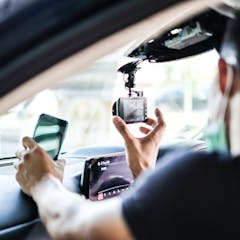
Articles on Data privacy
Displaying 1 - 20 of 284 articles

Wearables are on the rise, including a new category: neurotechnology. A headband that can track your brain activity sounds fun, but the data it collects should be stringently protected.

Privacy advocates lost out when Congress reauthorized Section 702 of the Foreign Intelligence Surveillance Act without major reforms. But the renewal fight returns in 2 years.

Before charging ahead to a world of AI babysitters and teacher or companion robots, we should consider this technology carefully to assess its appropriateness in children’s lives.

If the US wants to protect young people from misinformation and foreign influence, focusing on TikTok is barking up the wrong tree.

With 17 billion internet-connected devices worldwide, AI is subtly creeping into our everyday lives – and making us more vulnerable to cyberattacks.

Congress is considering bills to protect kids online. Some of what’s in those bills could help, but some elements could be harmful.

The dangers posed by the largely unregulated commercial data market prompted the Biden administration to try to prevent adversarial countries from exploiting Americans’ sensitive personal data.

We’re being tracked, targeted and profiled by businesses and data brokers. A new report on consumer data handling shows we need an urgent update of privacy laws.

New research shows that opt-in policies may not be as effective as intended when it comes to data protection and privacy regulations.

Paying for your parking via an app promises ease and efficiency. But we are entering a bargain with unclear terms around data privacy and public revenue.

Your data privacy is under threat from hackers, data brokers and big tech. Here’s what you can do about it. Step 1 is to get your colleagues, friends and family on board.

New guidance indicates health professionals must not provide information to the police without a woman’s consent unless “concerned for her safety or the safety of others”.

It’s no surprise that corporations harvest vast amounts of data about people, but documents in an FTC lawsuit detail the stunning amount that data brokers know about you and everyone else.

Your car’s safety technology takes you into account. But a lot of that technology helps car companies collect data about you. Researchers are working on closing the gap between safety and privacy.

Facebook and Instagram users in some parts of the world can now pay for an ad-free experience – but at what price?

Cars can collect data via cameras, microphones, sensors, and connected phones and apps. Our privacy laws need urgent reform if these data are to be kept safe.

AI technologies have been left largely unregulated in New Zealand – and barely discussed during the election campaign. The country needs a clear plan for the brave new digital world.

Everything apps offer a wide range of features, combining social media with personal finances. But creating the perfect everything app is no easy task.

The Federal Trade Commission’s investigation of ChatGPT maker OpenAI shows that the US government is beginning to get serious about regulating AI.

The government faces legal restrictions on how much personal information it can gather on citizens, but the law is largely silent on agencies purchasing the data from commercial brokers.
